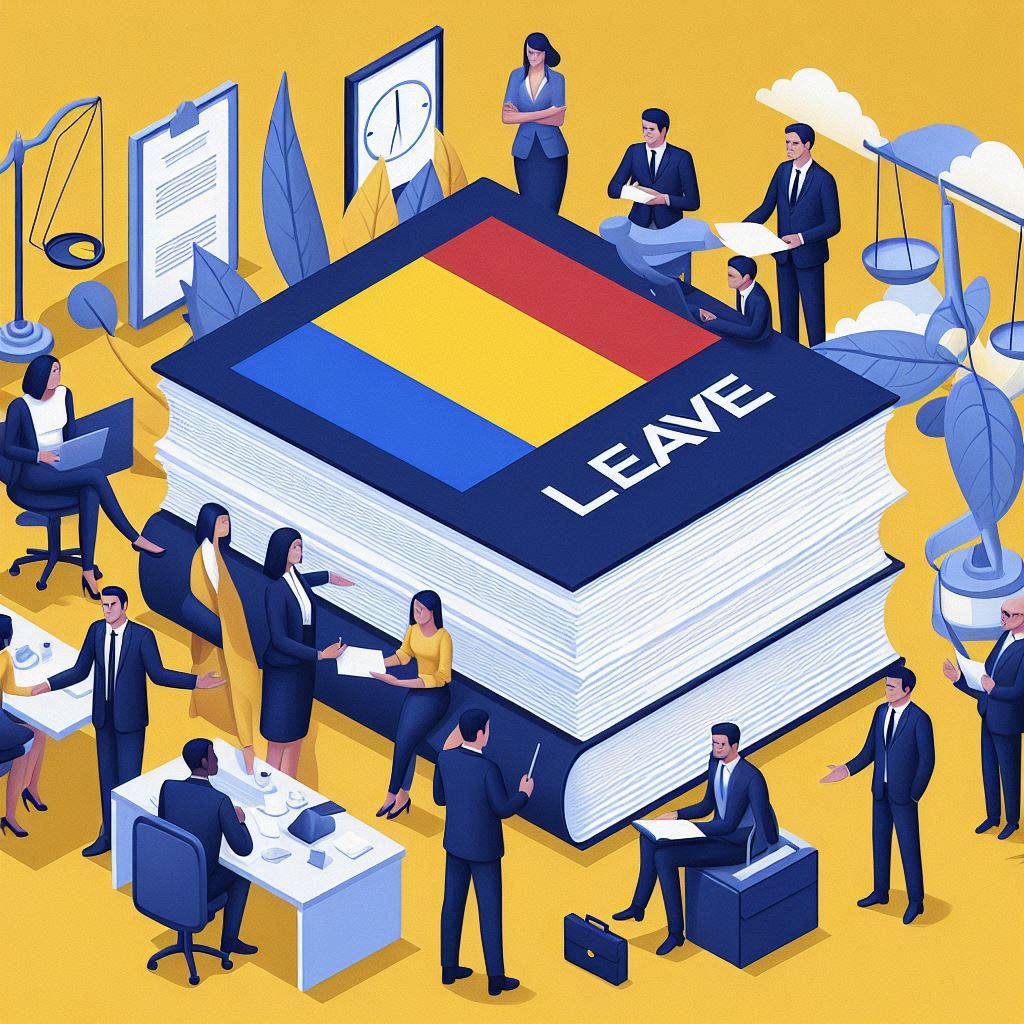Employee Rights During Company Restructuring in Romania
Employee Rights During Company Restructuring in Romania
Do you know your rights as an employee in Romania during company restructuring?
This is a big question for many workers as businesses change.
Knowing your rights is key to protecting yourself and handling uncertain times.
Romania’s labor laws protect employees during company changes.
They cover things like severance pay and the need for employee consultation.
It’s important for both workers and employers to understand these laws.
This guide will help you understand your rights during company reorganization in Romania.
We’ll look at legal steps, redundancy rules, and anti-discrimination laws.
Knowing your rights and what employers must do will help you face changes at work.
Key Takeaways
- Romanian labor laws provide specific protections during company restructuring;
- Employers must follow legal processes for restructuring and collective dismissals;
- Employees have rights to consultation, severance pay, and notice periods;
- Anti-discrimination protections apply during restructuring processes;
- Legal recourse is available for employees affected by improper restructuring;
- Understanding these rights is crucial for both employees and employers.
Understanding Company Restructuring in Romania
Company restructuring in Romania is a complex process with specific rules.
These rules aim to meet business needs while protecting employees.
Let’s look at the main points of this process.
Definition of Restructuring
In Romania, restructuring means cutting jobs for valid reasons.
This is based on real business or economic needs.
The Romanian Labor Code (Law no. 53/2003) outlines this process.
Common Reasons for Restructuring
Companies in Romania often restructure for economic or business reasons.
They might also outsource services.
These reasons must be well-documented to follow the law.
Legal Framework
The legal framework for restructuring in Romania puts a big focus on protecting employees.
It includes:
- Notification procedures;
- Employee consultation requirements;
- Severance pay regulations;
- Timelines for implementation.
Protecting employees during restructuring is very important.
Companies must follow strict rules to treat workers fairly.
| Company Size | Collective Dismissal Threshold |
|---|---|
| 20-100 employees | At least 10 employees |
| 100-300 employees | At least 10% of employees |
| 300+ employees | At least 30 employees |
It’s key for employers and employees to understand these rules in Romania.
This ensures everyone follows the law and respects each other’s rights.
Employee Rights During Company Restructuring Romania
Romanian workers facing layoffs have certain rights.
You must be informed and consulted during restructuring.
Your employer should tell you why and how it might affect your job.
Severance pay is a big right for those laid off.
The amount depends on how long you’ve worked there.
For example, someone working 5 years might get more than someone working 1 year.

Union rights are very important in restructuring.
If you’re in a union, your reps can talk for you.
They might find better solutions or severance deals.
There’s a 20 working day notice for layoffs in Romania.
This helps you get ready for the change.
Longer time at the company usually means more severance pay.
If you think your layoff was unfair, you can fight it.
The National Council for Combating Discrimination can look into it.
You can also go to civil or criminal courts if you feel your rights were broken.
The Legal Process of Restructuring in Romania
Restructuring a company in Romania is a complex legal process.
You must follow specific steps to comply with Romanian law.
This guide covers the restructuring process, including required documents, notification, and timelines.
Required Documentation for Restructuring
When restructuring your company in Romania, you need several important documents.
These include:
- A detailed reorganization plan;
- Shareholder and board resolutions;
- Legal opinions;
- Updated bylaws and articles of association;
- Financial statements;
- Regulatory approvals (if applicable).
Notification and Consultation Requirements
Romanian law requires strict consultation during restructuring.
You must notify and consult with employee representatives or unions.
This involves sharing information about the restructuring plan and its impact on workers.
Not following these steps could lead to unfair dismissal or discrimination claims.
Timeline for Implementing Restructuring Measures
The restructuring process in Romania usually takes at least 45 calendar days for collective dismissals.
This time allows for proper notification, consultation, and plan implementation.
It’s important to stick to this timeline to avoid legal issues and ensure a smooth transition for your company and employees.
| Stage | Duration | Key Actions |
|---|---|---|
| Preparation | 2-4 weeks | Document preparation, planning |
| Notification | 1 week | Inform employees and unions |
| Consultation | 2-3 weeks | Discuss with employee representatives |
| Implementation | 2-4 weeks | Execute restructuring plan |
Redundancy Procedures and Employee Protections
Redundancy rules in Romania guide employers on how to cut their workforce.
These rules protect workers and let companies change when needed.
It’s key for employers and employees to know these steps well.
Employers in Romania must explain why they’re cutting jobs.
They can do this due to economic or technical reasons.
They must follow strict notice periods, usually 20 working days, as the law requires.
Employee rights during layoffs include:
- First chance to get rehired if a similar job opens up within 45 days;
- Right to a minimum 20 business days’ notice;
- Protection from unfair firing;
- Right to compensation if firing rules are not followed.
Employers must check if a layoff is a collective one.
Collective layoffs happen when many employees are fired in a short time.
The rules depend on the company’s size and require talks with unions or workers’ groups.
To follow Romanian redundancy laws, employers should document their reasons for cutting jobs.
They should also use fair criteria for picking who gets rehired.
This way, they avoid legal issues and treat all workers fairly.
Collective Dismissals: Thresholds and Special Considerations
Collective dismissal rules in Romania protect workers during big layoffs.
These laws apply when companies plan to fire many employees quickly.
Definition of Collective Dismissal
In Romania, a collective dismissal happens when a company fires a certain number of workers in 30 days.
The exact number depends on the company’s size and how many workers are affected.
Employee Number Thresholds
The rules for when collective dismissal kicks in change based on company size:
- At least 10 employees for companies with 20-99 employees;
- 10% of employees for companies with 100-299 employees;
- At least 30 employees for companies with 300+ employees.
Additional Employer Obligations
Employers must do a lot when facing collective dismissals.
They need to talk to unions about restructuring and share details with worker reps.
The time for this varies by company size:
| Company Size | Consultation Period |
|---|---|
| Less than 100 employees | 15 days before notice |
| 101-250 employees | 20 days before notice |
| Over 351 employees | 30 days before notice |
Employers must tell labor authorities about planned layoffs and offer ways to reduce job losses.
Not following these rules can lead to layoffs being overturned.
This shows how crucial it is to follow the law during company changes.
Consultation with Unions and Employee Representatives
In Romania, talking to unions and employee reps is key when companies change.
The law says employers must tell unions about restructuring plans early.
This helps support workers and protect union rights during changes.
For big layoffs, certain rules apply:
- Companies with 21-99 workers: at least 10 employees dismissed;
- Companies with 100-299 workers: at least 10% of staff dismissed;
- Companies with 300+ employees: at least 30 employees dismissed.
Employers must start talks before making final decisions.
They must share important details like how many people will be let go, why, and when.
Unions or reps have 10 days to offer ways to avoid or lessen layoffs.
The goal of these talks is to find ways to avoid or lessen layoffs.
Employers must look at union suggestions within five days and explain their choices in writing.
This helps workers move smoothly and ensures they’re treated fairly during changes.
Severance Pay and Notice Periods in Romanian Restructuring
Severance packages in Romania are key during company restructuring.
There’s no legal minimum, but employers and employees or their reps often negotiate them.
Statutory Requirements for Severance Pay
Romanian law doesn’t set a minimum for severance pay.
Terms are usually found in collective bargaining agreements (CBAs) or individual contracts.
Employees let go due to restructuring, relocation, or health issues might get severance pay.
Notice Period Regulations
Notice periods in Romania depend on the job:
- Standard positions: 20 working days;
- Management roles: 45 working days.
These rules apply to both when employers fire employees and when employees quit, as the Romanian Labor Code states.
Calculation Methods
Worker compensation in restructuring in Romania is based on several things.
Severance pay often looks at:
- Length of service;
- Salary level;
- Position in the company.
Notice pay is usually the regular salary for the notice period.
| Position | Notice Period | Severance Pay |
|---|---|---|
| Standard | 20 working days | Negotiable |
| Management | 45 working days | Negotiable |
Knowing about severance packages and notice periods in Romania is vital for employers and employees dealing with restructuring.
Anti-Discrimination Protections During Restructuring
Romanian labor laws make sure employees are protected during restructuring.
Workplace discrimination in Romania is not allowed.
The law protects workers from unfair treatment based on race, nationality, age, and disability.
Employers must choose who to lay off fairly to avoid discrimination.
The National Council for Combating Discrimination makes sure these laws are followed.
They protect employee rights during restructuring.
New laws have made fighting harassment in Romanian workplaces stronger.
Employers must now have ways to find, investigate, and punish harassment.
They also have to protect victims and those who speak out from getting punished.
| Anti-Discrimination Measure | Requirement | Deadline |
|---|---|---|
| Harassment Reporting Procedures | Implement and maintain | April 17, 2024 |
| Annual Training | Conduct for all employees | Ongoing |
| Complaint Register | Establish and update | April 17, 2024 onwards |
Not following these rules can lead to big fines, from RON 30,000 to RON 50,000.
By following these laws, employers in Romania can make sure restructuring is fair.
They can also keep their workplaces free from discrimination.
Legal Recourse for Employees Affected by Restructuring
If you’re facing unfair dismissal claims during company restructuring in Romania, it’s crucial to understand your rights and legal remedies.
Romanian law provides several avenues for workers to challenge dismissals and seek compensation.
Grounds for Challenging Dismissals
You can contest dismissals based on procedural irregularities, discriminatory practices, or lack of genuine redundancy.
Regulatory compliance is key for employers, and any deviation can strengthen your case.
Filing Complaints and Lawsuits
To pursue legal remedies, you can file complaints with labor courts or the National Council for Combating Discrimination.
The process involves gathering evidence, submitting formal documentation, and presenting your case before the appropriate authority.
Potential Remedies and Compensation
Successful unfair dismissal claims can result in various legal remedies for workers, including:
- Reinstatement to your previous position;
- Compensation for lost wages;
- Damages for unfair dismissal.
| Type of Remedy | Description | Potential Outcome |
|---|---|---|
| Reinstatement | Return to previous job | Immediate job restoration |
| Lost Wages | Payment for missed work | Financial compensation |
| Damages | Additional compensation | Monetary award for unfair treatment |
Remember, collaboration with a specialized labor lawyer in Romania is essential for navigating these complex legal processes effectively.
They can help ensure your rights are protected and maximize your chances of a favorable outcome in unfair dismissal claims.
Conclusion
Employee rights in Romania have seen big changes, especially with Emergency Ordinance No. 9/2021.
This law made it easier for workers to get help from a special fund.
It helped solve problems like the miners’ strike in Valea Jiului, but also raised questions about money in the future.
New labor laws in Romania now require employers to tell workers about big changes like bankruptcy.
They must share details about pay and how it will be given.
These rules aim to make things clearer and protect workers when things are uncertain.
Knowing about severance pay in Romania is key for both employers and employees going through changes.
The law says that workers must get proof of their work within 60 days if their employer goes bankrupt.
To follow these rules and protect your rights, it’s wise to talk to a labor law expert in Romania.
As laws keep changing, it’s important to know about employee rights during company restructuring in Romania.
These updates try to balance solving immediate money problems and protecting workers for the long run.
By understanding these rules, everyone can handle restructuring better and more fairly.
FAQ
What are the key employee rights during company restructuring in Romania?
Employees have several rights during restructuring.
They have the right to know what’s happening and to be consulted.
They also get severance pay and notice periods.
Plus, they’re protected from unfair dismissal and can fight unjust terminations in court.
What is the legal framework governing restructuring processes in Romania?
The main law is the Romanian Labor Code (Law no. 53/2003).
It explains how to handle redundancies and collective dismissals.
It also protects employees during restructuring.
What are the common reasons for company restructuring in Romania?
Companies restructure for many reasons.
These include economic troubles, reorganizing the business, or outsourcing some tasks.
But, restructuring must be based on real reasons, not just excuses.
What are the notification and consultation requirements for employers during restructuring?
Employers must tell and talk to employee reps or unions about restructuring.
They need to share important details about the process.
This usually takes at least 45 days for big layoffs.
What are the notice period requirements during restructuring in Romania?
Employees get notice before being let go.
They get 20 days for jobs that need execution and 45 days for management roles.
This is during restructuring and when jobs are cut.
How is a collective dismissal defined in Romania?
Collective dismissals happen when a lot of employees are let go in a short time.
The number depends on the company’s size.
For small companies, it’s at least 10 employees in 30 days.
or bigger ones, it’s at least 30 in 30 days.
What are the employer’s obligations during collective dismissals?
Employers have to do more when letting many employees go.
They must talk more with unions or reps and tell labor authorities.
They also need to discuss social measures and help with finding new jobs for those let go.
Are there any statutory requirements for severance pay during restructuring in Romania?
Romania doesn’t have a minimum severance pay law.
But, employers and unions can agree on it.
They can also set it in company policies or contracts.
What anti-discrimination protections exist for employees during restructuring?
Romanian law protects against discrimination during restructuring.
This includes race, nationality, age, and disability.
Employers must pick fairly and not discriminate.
What legal recourse do employees have if they believe they were unfairly dismissed during restructuring?
Employees can fight unfair dismissals.
They can go to labor courts or the National Council for Combating Discrimination.
They can ask for their job back, money for lost wages, or damages for unfair dismissal.
What are the key aspects of employment law in Romania?
Employment law in Romania is primarily governed by the Romanian Labor Code.
This comprehensive legislation covers various aspects of the employer-employee relationship, including employment contracts, working hours, leave entitlements, termination procedures, and employee rights.
The code also addresses issues such as collective labor agreements, health and safety regulations, and disciplinary procedures.
Employers in Romania must adhere to these legal provisions to ensure compliance and maintain fair working conditions for their workforce.
What are the essential components of an individual employment contract in Romania?
An individual employment contract in Romania must include several key elements as provided by the law.
These typically include:
– The identities of the employer and employee
– Job title and description
– Place of work
– Duration of the contract (fixed-term or indefinite)
– Working hours and schedule
– Salary and payment details
– Probation period, if applicable
– Annual leave entitlement
– Notice period for termination
– Any collective agreement provisions that apply
It’s crucial for both parties to carefully review and understand all terms of the employment agreement before signing.
How is overtime regulated in Romania?
Overtime in Romania is strictly regulated by the Romanian Labor Code.
Generally, overtime should not exceed 8 hours per week.
Employees are entitled to receive either paid time off equal to the overtime worked or additional pay for overtime hours.
The overtime rate is typically at least 75% higher than the regular hourly rate





